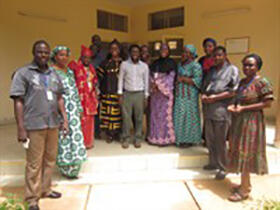
The partners of the Health, Education and Community Integration (IntHEC) consortium, led by LSTM’s Angela Obasi, are meeting in Niamey, Niger, to find effective ways to overcome barriers to improving adolescent reproductive health in sub-Saharan Africa which is essential to improve health and economic outcomes.
For example, women and girls in Niger have amongst the highest fertility rates and poorest pregnancy outcomes in the world. Poor reproductive health continues to be a key barrier to development in Tanzania as well.
But norms, cultures and practices within the health, education and community sectors continue to prohibit access, uptake and effective implementation of much needed services among adolescents in these countries and elsewhere.
In addition to collecting data in a large-scale cluster randomised survey, the programme has implemented a suite of interventions in a range of settings in both countries.
Preparations for this final, crucial year of the IntHEC consortium are underway. The key objectives will be to:
- Evaluate the lessons from the in-depth process evaluation that has been conducted and integrate this into the final year of the interventions
- Finalise the content and procedures for a final impact evaluation survey among over 7,000 individuals
- Distil experiences and outputs from the research to date into key policy products and publications
The workshop in Niamey provides a vital opportunity for scientists, government implementation teams and policy makers to exchange front line implementation experience of overlapping and complementary interventions and has already identified specific areas for exchange that can optimise the final year of activities.
The IntHEC consortium comprises partners from Belgium’s Catholic University of Leuven (UCL), Tanzania’s National Institute for Medical Research (NIMR), Ministry of Health and Social Welfare (MoSHW) and Ministry of Education and Vocational Training (MoEVT), Niger’s Laboratory of Study and Research for Social Dynamics and Development(LASDEL), Ministry of Public Health (MoPH), and the United Nations Population Fund (UNPFA) and is now entering its final year.